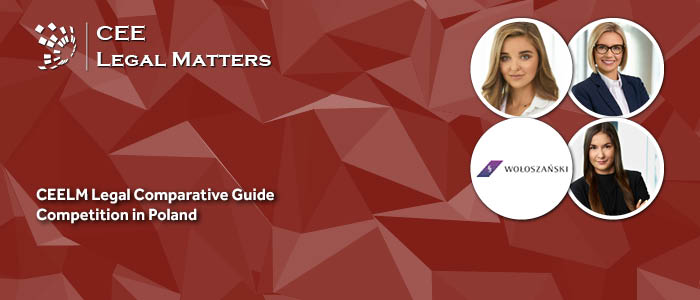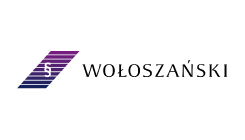Contributed by WLAW Woloszanski & Partners.
1. What are the main competition-related pieces of legislation in Poland?
In Poland, the cornerstone of competition law is the Act of 16 April 1993 on Combating Unfair Competition (Ustawa o zwalczaniu nieuczciwej konkurencji) and the Act on Competition and Consumer Protection, enacted on February 16, 2007 (Ustawa o ochronie konkurencji i konsumentow).
The Act on Combating Unfair Competition is a fundamental legal framework in Poland designed to protect fair market competition. This law outlines what constitutes unfair competition and includes
a comprehensive list of practices considered to be unfair. Key provisions address issues such as the infringement of trade secrets, counterfeiting of products, misleading markings on products, or advertising that can deceive consumers regarding their origin, quantity, quality, components, manufacturing process, suitability, and maintenance, among other significant characteristics, prohibited advertising, and violation of patented secrets. The act allows for civil claims by businesses harmed by unfair competition and establishes criminal penalties for certain violations. It also highlights the role of the President of the Office of Competition and Consumer Protection in taking action against practices that violate the principles of fair competition, aiming to protect not only the interests of individual entrepreneurs but also consumer interests and ensure fair and equitable conditions of market activity.
The Competition and Consumer Protection Act sets out the rules for the promotion and protection of competition and outlines the principles for the protection of the interests of both entrepreneurs and consumers within the framework of the public interest. The law includes provisions on anti-competitive practices, infringements of the collective interests of consumers, and the prohibition of unfair contract terms. It also provides for measures to prevent anti-competitive mergers between entrepreneurs and their associations. In particular, the law designates the competent authorities in charge of competition and consumer protection matters.
Supplementary regulations influencing competition law include the Act of March 8, 2013, addressing the prevention of undue delays in commercial transactions (Ustawa o przeciwdzialaniu nadmiernym opoznieniom w transakcjach handlowych), and the Act of April 21, 2017 concerning claims for restitution of damages resulting from violations of competition law (Ustawa o roszczeniach o naprawienie szkody wyrzadzonej przez naruszenie prawa konkurencji).
Ensuring compliance with competition law is the responsibility of the Office of Competition and Consumer Protection – OCCP (Urzad Ochrony Konkurencji i Konsumentow – UOKiK), tasked with monitoring and enforcing compliance with these statutory provisions.
2. Have there been any notable recent (last 24 months) updates of Polish competition legislation?
Over the past twenty-four months, apart from the state aid measures to combat the COVID-19 pandemic, there has been notable progress in the area of competition law. Toward the end of 2022, revisions were made to the regulations on payment congestions. The President of the Office for Competition and Consumer Protection was given the power to issue soft summonses to entrepreneurs, bypassing the need for administrative proceedings. Upon receipt of such a summons, entrepreneurs may provide explanations on identified risks of payment congestions, thereby promoting an improved payment culture among their business partners.
Effective January 1, 2023, the Omnibus Directive, aimed at enhancing consumer rights protection, fostering fair treatment of consumers by businesses, and promoting collaboration among consumer protection authorities, has been enacted in Poland. Also effective from the same date are the Digital Directive and the Commodities Directive. The former sets out rules for contractual obligations relating to the provision of digital content or services, while the latter sets out rules for contractual obligations relating to the sale of goods.
In May 2023, the latest amendment to the Competition and Consumer Protection Act entered into force. This amendment incorporated Directive 2019/1 of the European Parliament and of the Council (EU) dated December 11, 2018, commonly referred to as the “ECN+ Directive.” The amendment broadened liability for restrictive practices, established protocols for imposing fines on business associations, replaced delayed penalties with new periodic penalties, altered rules concerning inspections and searches, extended the “leniency” program to collusive bidding, and streamlined the exchange of information and mutual recognition of competences among EU member states’ competition authorities, with the aim of enhancing law enforcement effectiveness and ensuring the proper functioning of the internal market.
Furthermore, since June 2023, provisions of the Council of Ministers’ Decree concerning the exclusion of certain types of vertical agreements from restrictive agreement prohibitions have been effective in Poland. This new regulation mirrors the European Commission’s Vertical Block Exemption Regulation (VBER) directly. This development holds particular significance for entities engaged in distribution systems, notably in selective distribution networks such as the automotive industry, emphasizing the need for compliance and strategic adaptation.
3. What are the main concerns of the national competition authority in terms of the agreements between undertakings? How is the sanctioning record of the authority?
The Polish competition authority, primarily represented by the President of the Office of Competition and Consumer Protection, focuses on various concerns regarding agreements between undertakings to ensure fair competition in the market. Some of the main concerns include:
- Anti-competitive agreements – the OCCP scrutinizes agreements between undertakings that aim to distort competition, such as cartels, price-fixing agreements, market allocation agreements, and bid rigging schemes.
- Abuse of dominant position – the authority monitors the conduct of dominant market players to prevent abuse of their position, including unfair pricing practices, discriminatory behavior, and refusal to deal with competitors or customers.
- Vertical restraints – the OCCP evaluates agreements between undertakings at different levels of the supply chain, such as vertical agreements between manufacturers and distributors, to ensure they do not restrict competition unfairly, for example, through resale price maintenance or exclusive dealing arrangements.
Merger control – the authority assesses mergers and acquisitions to prevent concentrations that could significantly impede effective competition in the market, particularly those that may lead to the creation or strengthening of a dominant position.
In terms of sanctioning, the OCCP has a track record of imposing fines and other penalties on entities found to have violated competition law. The authority’s enforcement actions aim to deter anti-competitive behavior and protect the interests of consumers and businesses. Sanctions typically include fines proportional to the seriousness and duration of the infringement, which can amount to a significant percentage of the undertaking’s turnover.
While the provisions of the law state that these fines are up to 10% of the yearly turnover of the undertaking, OCCP has issued specific guidelines detailing the methodology for calculating fines based on the circumstances of each case, enabling companies to gauge the financial risk associated with infringements, a protocol actively adhered to by the OCCP in practice.
The OCCP also actively utilizes its authority to impose personal fines of up to PLN 2 million on managers responsible for unfair practices. Additionally, the OCCP may impose behavioral remedies or structural measures to restore competition in affected markets. The authority’s enforcement efforts contribute to maintaining a competitive and fair business environment in Poland.
4. Which competition law requirements should companies consider when entering into agreements concerning their activities in Poland?
When entering into agreements concerning their activities in Poland, companies should consider various competition law requirements to ensure compliance with Polish regulations. Some key considerations include:
Prohibition of anti-competitive agreements
Companies should be aware of the prohibition against anti-competitive agreements, such as price-fixing, market allocation, and bid-rigging. Any agreements that restrict competition in the Polish market may be deemed illegal and subject to fines.
Dominance and abuse of dominance
Companies with a dominant position in the Polish market should be cautious of engaging in abusive conduct, such as predatory pricing, refusal to deal, or discriminatory practices. Such conduct may be subject to scrutiny under Polish competition law.
Merger control
Companies planning mergers or acquisitions that meet certain turnover thresholds must notify the Polish Competition Authority (OCCP) and obtain clearance before completing the transaction. Failure to comply with merger control requirements can result in fines and even nullification of the transaction.
Vertical restraints
Agreements containing vertical restraints, such as exclusive distribution arrangements in some cases, resale price maintenance, or territorial restrictions, may require careful assessment to ensure compliance with Polish competition law. While some vertical restraints may be permissible under certain conditions, others may be considered anti-competitive.
Timeliness of commercial payments
When concluding contracts relating to their activities in Poland, companies should be aware of the restrictions introduced to combat late payment in both B2B (business-to-business) and B2G (business-to-government) transactions. Entrepreneurs are obliged to report annually to the OCPP on the timeliness of payments in their commercial transactions. The Office therefore has all the data it needs to penalize non-compliance with the rules aimed at reducing undue delays in commercial transactions, showing a clear willingness to enforce these rules.
Information exchange
Companies should be cautious when exchanging sensitive information with competitors, customers, or suppliers. Information exchange that leads to the coordination of competitive behavior, such as price signaling, may raise concerns under Polish competition law.
Leniency program
Companies that uncover their involvement in cartel activity may benefit from leniency or immunity from fines if they cooperate with the competition authority’s investigation. Understanding the requirements and procedures of the leniency program can be crucial for companies involved in anti-competitive conduct.
Compliance programs
Implementing effective compliance programs can help companies prevent violations of competition law in Poland. Training employees on competition law requirements, establishing reporting mechanisms for potential violations, and conducting regular audits can all contribute to ensuring compliance.
Penalties for non-compliance
Companies should be aware of the potential penalties for non-compliance with Polish competition law, including fines of up to 10% of the company’s (or capital group) turnover, director disqualifications, and damages claims from affected parties.
Overall, companies operating in Poland should carefully assess their agreements and business practices to ensure compliance with the country’s competition law requirements and mitigate the risk of antitrust violations. Seeking legal advice from experts familiar with Polish competition law can also be beneficial in navigating these complexities.
5. Does a leniency policy apply in Poland?
Poland’s Office of Competition and Consumer Protection implements a leniency program under the country’s competition law. This program allows entrepreneurs and their managers to seek reduced or waived penalties if they’ve been involved in restrictive agreements.
Entrepreneurs seeking leniency must adhere to specific conditions outlined in the Law on Competition and Consumer Protection. They must submit an application containing detailed information and evidence as specified in Article 113a (2) of the law. This includes details about the prohibited agreement, the involved parties, products or services affected, the circumstances of the agreement, and evidence supporting the application.
Applicants must cooperate fully with the OCCP, providing relevant evidence or information, ensuring no hindrance to the investigation, and refraining from tampering with evidence. They must also cease participation in the agreement upon filing the leniency application.
The leniency program extends to managers who knowingly allowed the violation of competition laws through their actions or inactions. The rules for participation apply to managers, requiring them to provide necessary information within their capacity.
Applicants can be completely exempted from monetary penalties for their first application. Subsequent applicants may receive a reduction in fines, up to 50% depending on the order of application and quality of cooperation. Additionally, the leniency plus program offers an extra 30% reduction if new information about another agreement is provided.
Information and evidence provided under the leniency program are released to other parties only before a decision is issued unless otherwise agreed upon by the applicant.
6. How is unilateral conduct treated under Poland’s competition rules?
In the legal framework of Poland, the acquisition of a dominant position by an economic entity is permissible, but its misuse is prohibited under competition law. These matters are governed by the Law on Competition and Consumer Protection. In Polish competition law, abuse of dominant position refers to actions taken by a dominant market player that exploits their powerful position to restrict competition unfairly. Such abuse can take various forms, including:
- Unfair pricing practices – this involves setting prices at either excessively high or abnormally low levels to eliminate or limit competition unfairly.
- Restriction of production, market, or technical development – dominant entities may engage in practices that hinder the production, market access, or technological advancements of competitors, thereby maintaining their dominant position without legitimate competitive merits.
- Imposing non-uniform contract terms – using contractual terms that create disparities in competition, such as offering preferential conditions to certain customers while imposing burdensome terms on others, with the intention of distorting competition.
- Predatory behavior – deliberately undercutting prices to drive competitors out of the market, with the intention of raising prices once competition is eliminated.
- Refusal to deal or supply – refusing to supply goods or services to competitors or customers without justifiable reasons, thereby impeding their ability to compete effectively.
- Tying and bundling practices – forcing customers to purchase unwanted products or services along with the desired ones, leveraging the dominant position in one market to strengthen it in another.
- Exclusive dealing – imposing exclusive contracts or agreements that prevent customers or suppliers from dealing with competitors, thereby foreclosing competition in the market.
- Discriminatory behavior – treating similarly situated customers or competitors differently without reasonable justification, with the aim of undermining competition.
An entrepreneur is considered to hold a dominant position if its market share exceeds 40%. However, surpassing this threshold does not inevitably establish dominance. Other entrepreneurs operating within the market may possess significant competitive capabilities, enabling effective competition despite one entity’s substantial market share. Additionally, dominance can be jointly held by multiple entrepreneurs through coordinated actions, known as a “collective dominant position.”
Abuse of a dominant position is prohibited under Polish competition law as it distorts the level playing field and undermines the benefits of competition, such as lower prices, innovation, and consumer choice. The Office of Competition and Consumer Protection is responsible for enforcing these provisions and may impose fines or other penalties on entities found guilty of abusing their dominant position. Such penalties may reach up to 10% of the entrepreneur’s annual turnover from the year preceding the penalty imposition. Furthermore, the decisions made by the OCCP are publicly disclosed to inform the public about entrepreneurs’ unfair practices and the repercussions of abusing a dominant position. Additionally, the OCCP is empowered to prevent the emergence of dominant positions in the market by overseeing concentrations of entrepreneurs. If a concentration is anticipated to establish or reinforce a dominant position, the OCCP reserves the authority to decline approval or impose specific obligations on the involved entrepreneurs.
7. Are there any recent local abuse cases of relevance?
Recently, there has been a lack of notable antitrust investigations concerning the abuse of market dominance in recent years. The most recent instance appears to be a determination by the President of the Office of Competition and Consumer Protection in early 2021 regarding Poczta Polska’s (Polish Post) abuse of its dominant position in the domestic wholesale market for services encompassing the acceptance, sorting, movement, and delivery of letter mail and address advertising mail.
8. What are the consequences of a competition law infringement?
Infringements of competition law entail administrative, civil, and potentially criminal liabilities. Administrative liability, the most common consequence, consists mainly of fines, with the amount of the fine depending on the gravity, duration, and nature of the infringement.
Antitrust violations may result in fines of up to 10% of an entrepreneur’s total global turnover. Additionally, fines of up to EUR 50 million may be imposed for obstructing inspections, providing false information, or failing to comply with requests from the OCCP. The Competition and Consumer Protection Act details the criteria for determining fines for various types of infringements, including a list of mitigating and aggravating circumstances. These circumstances are assessed collectively and individually for each case and entrepreneur, and they vary in importance and affect the reduction or increase of fines. Mitigating circumstances that may lead to a reduction of the fine include coercion, voluntary rectification of the infringement, voluntary cessation of the infringement before or immediately after the opening of the procedure, proactive measures to stop or rectify the infringement, and cooperation with the office during the investigation, in particular by contributing to a speedy and efficient procedure. Aggravating factors that may increase the penalty include: leading or initiating an agreement restricting competition or encouraging others to participate, coercing or pressuring others to comply or continue the infringement, previous similar infringements, and intentional infringement.
Corporate managers face fines of up to PLN 2 million (personal liability) for deliberate breaches of specific antitrust laws, while inadvertent violations may incur fines of up to 50 times the average salary. The President of the OCPP shall impose fines on managing individuals, taking into account relevant legal circumstances in separate steps, including:
- the nature of the violation, its seriousness;
- the extent of the managing individual’s impact on the violation;
- aggravating and mitigating factors;
- the duration of the infringement;
- previous violations of the Competition and Consumer Protection Act, excluding those similar to the current violation being penalized;
- the appropriateness of the penalty, considering the violation as a whole, including the income of the managing person from the enterprise (taking into account the duration of the violation);
Failure to implement OCCP decisions may lead to additional penalties of up to EUR 10,000 per day.
Civil liability arises from antitrust infringements, entitling affected parties to full compensation for damages incurred, such as increased prices or lost profits. The Law on Claims for Reparation of Damage Caused by Breach of Competition Law, aligning with EU Directive 2014/104/EU, facilitates private enforcement in Poland. Claimants benefit from extended five-year statutes of limitations and have access to district courts.
While the Polish legal system doesn’t directly impose criminal sanctions for antitrust violations, certain actions may constitute criminal offenses under the Criminal Code, such as unlawful interference with public tenders. However, non-compliance with requests from the Consumer Ombudsman carries a misdemeanor penalty, with fines starting at PLN 2,000.
At the European level, the European Union may impose fines of up to 10% of a company’s total global turnover for antitrust violations. The European Commission considers various factors in determining penalties, including the nature, severity, and duration of the breach. Moreover, periodic fines of up to 5% of an entrepreneur’s average daily turnover may be imposed for delays or non-compliance with obligations or information requests.
9. Is there any competition law requirement in case of mergers & acquisitions occurring or impacting the Polish market?
Excessive consolidation among companies can detrimentally impact competition. Hence, the primary responsibility of the Office of Competition and Consumer Protection is to oversee transactions between enterprises, focusing on those with potential influence on the Polish market.
Under the Act on Competition and Consumer Protection, the acquisition of control is broadly defined as any direct or indirect acquisition of rights that provides the ability to exercise decisive influence over undertakings. Transactions subject to scrutiny include mergers of independent entities, acquisition of exclusive or shared control over undertakings, formation of joint ventures, and asset acquisitions.
For a merger to require notification in Poland, it must exceed certain thresholds. These include:
- Total global turnover of participating undertakings exceeding EUR 1 billion in the financial year preceding notification; or
- Total turnover within Poland surpassing EUR 50 million for participating undertakings in the financial year preceding notification.
Notification to OCCP is feasible once the merger intent is sufficiently defined, and supported by evidence such as conditional agreements, letters of intent, memoranda of understanding, written offers, or joint resolutions of undertakers’ governing bodies. Notably, notifications are to be submitted by active participants of the merger – namely, purchasers of stocks, shares, or assets of the other undertaking.
10. What is the normal merger review period?
In accordance with the provisions outlined in the Law on Competition and Consumer Protection, antimonopoly proceedings concerning concentration cases are typically finalized within one month from the date of initiation.
However, this timeline does not encompass periods for submission of notifications by other participants involved in the concentration, payment of application fees, rectification of defaults, or supplementation of information, which the authority may request repeatedly throughout the proceedings.
In practice, the duration of proceedings may extend beyond one month due to these factors.
In justified circumstances, such as complex mergers, those likely to significantly restrict competition in the market, or mergers necessitating market studies, phase two of antitrust proceedings may be initiated. This initiates an extension of the merger clearance deadline by an additional four months. It is important to note that similar to phase one, this extension does not include the waiting period mentioned previously.
The extension of the one-month deadline is determined through a decision issued by the OCCP. While there is no provision for appeal against this decision, it must include appropriate justification.
11. Are there any fees applicable where transactions are subject to local competition review?
An application to initiate antimonopoly proceedings in concentration cases incurs a fixed fee of PLN 15,000, payable by the notifying entrepreneur. This fee must be remitted in cash at the cashier’s office or via bank transfer to the tax office associated with the seat of the President of the Office.
In cases involving more than one party, a single fee is charged. This fee is based on the request to initiate an antimonopoly procedure and not on the number of parties involved.
12. Is there any possibility for companies to obtain State Aid in Poland?
The competencies of the President of the Office of Competition and Consumer Protection regarding public aid are governed by the Act of April 30, 2004, on proceedings in public aid cases. Under this act, the President of the Office assesses aid projects, notifies the European Commission, represents the Polish government in Commission proceedings, and oversees public aid granted to entrepreneurs in Poland.
Aid programs, defined as normative acts such as laws or regulations, establish the legal framework for providing specific support to entrepreneurs. These programs also outline the principles and conditions for granting aid, including the eligible recipients, forms of support (e.g., grants, tax payment installments, guarantees), purposes (e.g., training, research, and development, environmental protection, employment enhancement, restructuring), granting authorities, maximum support amounts, and program durations.
It is essential to note that aid programs typically do not specify individual recipients but instead provide a general and abstract framework for aiding eligible entrepreneurs.
Before an aid program can take effect, it must receive approval from the European Commission, unless it falls under de minimis aid or block exemption programs, which do not require Commission approval. The Council of Ministers decides on whether to notify the Commission of the program, following a review of the President of the OCCP’s opinion on its compliance with internal market regulations. Upon Council approval, the OCCP President proceeds with the necessary notification.
The Polish legal system also includes provisions for individual aid, which is aid granted outside of established aid programs. Individual aid, including aid for restructuring, is based on normative acts not approved by the European Commission as aid programs. Restructuring aid requires the development of a comprehensive restructuring plan by the entrepreneur, outlining actions aimed at restoring long-term market competitiveness. This plan must be grounded in realistic assumptions and implemented expeditiously.
The European Commission possesses the authority to establish regulations that preapprove certain types of aid, thereby exempting them from the requirement of prior notification and approval. These exemptions encompass projects falling under block exemptions and de minimis aid.
Block exemptions, governed by EU Regulation 651/2014, cover various categories of support, including regional aid, aid for small and medium-sized enterprises (SMEs), environmental protection aid, research and innovation aid, training aid, aid for disadvantaged and disabled workers, and aid for cultural, sports, and infrastructure projects.
De minimis aid, on the other hand, represents a special category of state support deemed insignificant in its potential to distort competition across the EU due to its nominal value. Widely utilized by entrepreneurs, de minimis aid involves acquiring public funds or enjoying specific concessions, without the need for formal reporting.
13. What were the major changes brought by the COVID-19 pandemic? Have any of them stuck and how likely is it for these changes to continue to do so in the foreseeable future?
At the outset of the COVID-19 crisis, a substantial array of new aid initiatives was implemented, while the reach and magnitude of existing aid programs were augmented at both the European Union and domestic levels. There is no doubt that an unprecedented effort has been made in this area by both national and EU authorities.
The financial support provided by the EU and Poland was mainly used by companies to mitigate the effects of the pandemic and its economic consequences. Despite these extensive aid measures, there were no notable alterations made to Polish competition law in response to the COVID-19 crisis.





